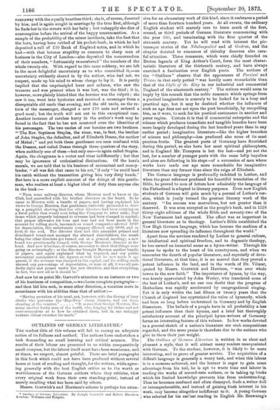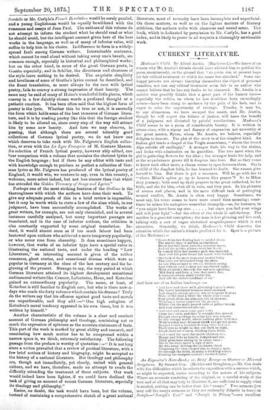OUTLINES OF GERMAN LITERATURE.* THE modest title of this volume
will fail to convey an adequate notion of its fullness and method. The authors have undertaken a task demanding no small learning and critical acumen. The results of their labour are presented to us within comparatively small compass, but the labour itself must have been wearisome, and at times, we suspect, almost painful. There are brief paragraphs in this book which could not have been produced without several hours at least of reading and thought, for the writers, while agree- ing generally with the best English critics as to the worth or worthlessness of the German authors whom they criticise, view every original work from their own standing-point, instead of merely recalling what has been said by others.
Messrs. Gostwick's and Harrison's scheme is perhaps too erten-
• Outlines of German Literature. By Joseph Uustwick and Robert Harrison. London: Williams and Norsate.
sive for an elementary work of this kind, since it embraces a period of more than fourteen hundred years. At all events, the ordinary English student will scarcely care to learn much of the first,
second, or third periods of German literature commencing with the year 360, and terminating with the first quarter of the sixteenth century. Yet he will read with interest the pic- turesque stories of the Nibs/tinge/died and of Gudrun, and the chapter devoted to romances of chivalry deserves also care-
ful attention. These romances, which were chiefly founded on Breton legends of King Arthur's Court, form the most charac- teristic literature of the thirteenth century, and have always exercised a fascination over English poets. The authors of
the " Outlines " observe tkat the appearance of Parzival and Tristan in that early period "was hardly more remarkable than that of the idylls of the Kirig in our industrial and commercial England of the nineteenth century." The writers would seem to imply by this remark that the noble romance which springs from a poetical imagination is scarcely to be looked for in a busy and practical age, but it may be doubted whether the influence of such an age does not act upon the poet beneficially, by compelling him, as it were, to seek for his poetical sustenance in another and purer region. Certain it is that if commercial enterprise and the science which produces immediate and tangible benefits have been more largely developed during the last hundred years than in any earlier period ; imaginative literature—like the higher branches of science and philosophy—has produced also some of its most precious fruits. The greatest poets of Germany have flourished during this period, so also have her most spiritual philosophers, and in England Mr. Tennyson is but the last—and yet not the last, for a number of younger poets with the same lofty impulses and aims are following in his steps—of a succession of men whose works have made our age more remarkable for imaginative literature than any former time since the reign of Elizabeth.
The German language is profoundly indebted to Luther, and when the great reformer produced his beautiful translation of the Bible, he proved to men of letters how admirably the language of the Fatherland is adapted to literary purposes. Even now English students of German will gain much by a perusal of Luther's ver- sion, which is justly termed the greatest literary work of the century. "Its success was marvellous, but not greater than it deserved. It was soon accepted as the people's book, and in 1658 thirty-eight editions of the whole Bible and seventy-two of the New Testament had appeared. The effect was as important in general literature as in theology. Luther's Bible established the New High German language, which has become the medium of a literature now spreading its influence throughout the world."
Apart from the services rendered by Luther to general culture, to intellectual and spiritual freedom, and to dogmatic theology, he has earned an immortal name as a hymn-writer. Through his hymns he spoke to the heart of his countrymen, and when we remember the dearth of popular literature, and especially of devo- tional literature, at that time, it is no marvel that they proved a potent influence in the land, and in the words of Dr. Vilmar, quoted by Messrs. Gostwick and Harrison, "won over whole towns to the new faith." The importance of hymns, by the way, was keenly appreciated by John Wesley, who translated some of the beat of Luther's, and no one can doubt that the progress of Methodism was rapidly accelerated by congregational singing. Yet it is only within the last fifteen or twenty years that the Church of England has appreciated the value of hymnody, which had been so long before understood in Germany and by English Dissenters. The ballads of a people have in all probability a less potent influence than their hymns, and a brief but thoroughly satisfactory account of the principal hymn-writers of Germany forms an interesting feature of this volume. In few works devoted to a general sketch of a nation's literature are such compositions regarded, and the more praise is therefore due to the authors who give to them their just weight.
The Outlines of German Literature is written in so clear and pleasant a style, that it will attract many readers unacquainted with German. To the student, however, it is likely to be more interesting, and to prove of greater service. The acquisition of a difficult language is generally a weary task, and when this labour is in a measure achieved, and the learner is eager to gain some advantage from his toil, he is apt to waste time and labour in reading the works of second-rate authors, or in taking up books which his limited knowledge prevents him from understanding. Thus he becomes confused and often dismayed, finds a.writer dull or incomprehensible, and instead of gaining fresh interest in his work, may become altogether indifferent to it. A young German who selected for his earliest reading in English Mr. Browning's Sortie no or Mr. Carlyle's French Revolution would be sorely puzzled, and& young Englishman would be equally bewildered with the romances and essays of Jean Paul. The authors of this volume do not attempt to inform the student what he should read or what he should avoid, but the intelligent account given here of the best works in the language, as well as of many of inferior value, will suffice to help him in his choice. Indifference to form is a widely- spread fault among German writers. Interminable sentences, which cannot be read aloud without taking away one's breath, are common enough, especially in historical and philosophical works ; but on the other hand, in some of the great German poets, in Goethe especially, and in Schiller, the directness and clearness of the style leave nothing to be desired. The exquisite simplicity and loveliness of some of Goethe's lyrics cannot be described, and the finest translation, as must always be the case with lyrical poetry, fails to convey a strong impression of their beauty. The same may be said of many of flame's wonderful little pieces, which convey in a few daintily chosen words a profound thought or a pathetic emotion. It has been often said that the highest form of poetry is the lyric. Whether this be true or not, it is assuredly the form which holds some of the best treasures of German liters- ture, and it is by reading poetry like this that the foreign student is likely to be allured on, since every step of the way will attract him by some new beauty. And here we may observe, in passing, that although there are several tolerably good collections of German lyrical poetry, we do not know one which deserves to take rank with Mr. Palgrave's English collec- tion, or even with the La Lyre Frangaise of M. Gustave Masson. No selection of French lyrical poetry, however ably edited, can bear comparison with a volume that contains the choicest lyrics in the English language ; but if there be any editor with taste and with knowledge enough to produce as perfect a collection of Ger- man lyrics as Mr. Palgrave has produced of the lyrical poetry of England, it would win, we venture to say, even in this country, a welcome, more select indeed, but not less sincere than that which has attended the Golden Treasury of Songs and Lyrics."
Perhaps one of the most striking features of the Outlines is the thoroughness with which the authors have done their work. To give any adequate proofs of this in a brief review is impossible, but it may be worth while to state a few of the aims which, in our judgment, have been successfully accomplished. The works of great writers, for example, are not only chronicled, and in several instances carefully analysed, but many important passages are translated, and in the case of inferior authors, the criticism is also constantly supported by some original translation. In- deed, it would almost seem as if too much labour had been bestowed upon authors who achieved a mere temporary popularity, or who never rose from obscurity. It does sometimes happen, however, that works of an inferior type have a special value in illustrating the national taste, and under the heading "Low Literature," an interesting account is given of the robber romances, ghost stories, and sensational dramas which were so popular in Germany at the close of the last century and the be- ginning of the present. Strange to say, the very period at which German literature attained its highest development sensational and immoral writers like Cramer, Lafontaine, Heun, and Kotzebue gained an extraordinary popularity. The name, at least, of Kotzebue is still familiar to English ears, but who is there nowa- days who reads the forty volumes which contain his dramas? Truly do the writers say that his offenceEs against good taste and morals are unpardonable, and they add :—" One high eulogium of Kotzebue's moral tendency appeared in his own times, but it was written by himself."
Another characteristic of the volume is a clear and succinct account of German philosophy and theology, containing not so much the expression of opinions as the accurate statement of facts. This part of the work is marked by great ability and research, and considering how much matter has to be compressed within a narrow space is, we think, extremely satisfactory. The following passage from the preface is worthy of quotation :—" It is not long since a notion prevailed that a review of poetical literature, with a few brief notices of history and biography, might be accepted as the history of a national literature. But theology and philosophy are, though not immediately, yet closely, united with general culture, and we have, therefore, made no attempt to evade the difficulty attending the treatment of these subjects. Our work would indeed have been lighter, if we could have declined the task of giving an account of recent German literature, especially its theology and philosophy."
Easier, no doubt, the task would have been, but the volume, instead of containing a comprehensive sketch of a great national literature, must of necessity have been incomplete and superficial. On these matters, as well as on the lighter matters of literary criticism, the authors write with clearness and sound sense. The book, which is dedicated by permission to Mr. Carlyle, has a good index, and is likely to prove in all respects a thoroughly serviceable work.































 Previous page
Previous page